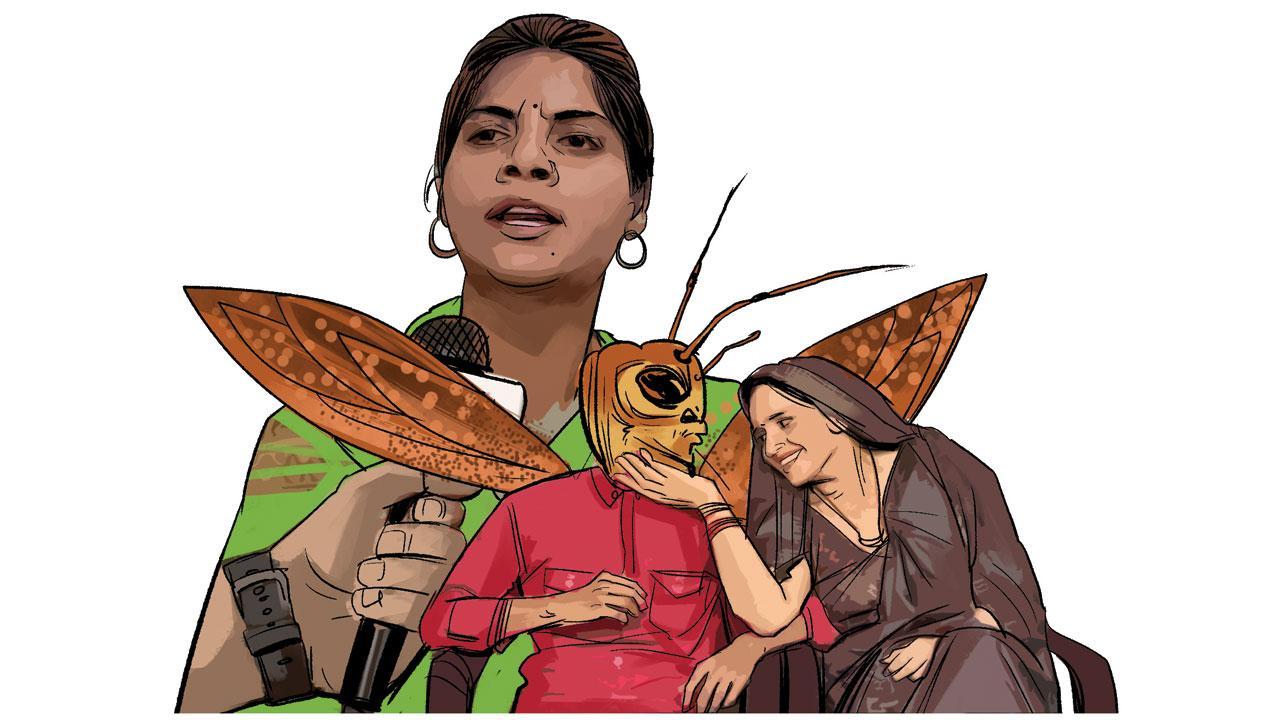What indeed could elicit such daring, that a woman should cross over from Pakistan via Nepal to Noida, that too with four children in tow? Perhaps the question is, “kya hai Seema?”

Illustration/Uday Mohite
![]() Sachin Meena and Seema Haider are not the first couple to have fallen in love across the Veer-Zara border via the internet—playing PUBG, a battle game, making the metaphors too much to take. But aur bhi neighbours hain zamane mein, closer to home, ready for combat.
Sachin Meena and Seema Haider are not the first couple to have fallen in love across the Veer-Zara border via the internet—playing PUBG, a battle game, making the metaphors too much to take. But aur bhi neighbours hain zamane mein, closer to home, ready for combat.
ADVERTISEMENT
Consider the woman, mostly referred to in the media as “Seema’s Indian neighbour” and “Savage green sari woman” and the viral video of her colourful consternation at the Sachin-Seema love story. “Kya hai Sachin? Lappu sa Sachin… jhingoor sa ladka” (“what even is Sachin? Gormless Sachin, more cricket, less boy”).
What indeed could elicit such daring, that a woman should cross over from Pakistan via Nepal to Noida, that too with four children in tow? Perhaps the question is, “kya hai Seema?”
For that we need to only watch Seema’s videos with Sachin. Not only is she quite aware that lappu Sachin is jhingur-sa, that seems to be the charm. During interviews, she cannot stop smiling and touching Sachin’s face. “Two of my sahelis in Pakistan also said to me, what do you see in him? But you have to see him with the look of love, right, through my eyes?” At such moments Sachin twinkles and smiles shyly and you kind of see how a jhingur boy might let a Seema be her full alpha self, take the romantic lead. Seema is 30, Sachin, 23 and we witness indulgence mixed with the attraction. They are impressed by themselves.
That Seema’s husband Ghulam Haider, working in Saudi Arabia, did not know she was missing till the Indian media reported, adds a layer to this tale. Migrations for work are hard for all. They leave women differently lonely, given the nature of social roles and restrictions. Devar-sized boys, with wide eyes can make a woman feel light-hearted and admired, infuse thrill and adventure into the mundane every day.
In a world which circumscribes women’s lives and possibilities in many ways, romance—wise or unwise—can make a woman feel like a contender, like she could be someone, even if it’s someone’s someone.
Why else does Lacchi, in the story Duvidha (by Vijaydan Detha, later a film by Mani Kaul remade as Paheli starring Shahrukh Khan) falls in love with her attentive ghost-lover when her husband goes away to trade in other lands. Any wonder that the noona romance is a popular K-drama genre (romance between older women and younger men—noona means big sister)?
In folk tales travelling salesmen brought the breeze of desire into homes. Now the internet that provides the ache and break of love, wherever it may lead.
Meanwhile green sari, having tasted social media’s look of love—and understanding it is fickle—has followed up the original jhingur interview with another where she has called Sachin keeda sa ladka (not very fresh content alas, but being lappu-ed up nevertheless #Sorrynotsorry). But now her objections have escalated to include sympathy for the husband, wanting to know why Seema couldn’t find love in Pakistan and demanding DNA tests for the kids. Love might get you the attentions of one. Vitriol can make you a world wide web dream. Both women are propelled by a quest for adventure and significance in their own ways. After all we all want to be someone, even if it’s only the Internet’s someone. Lappu Sachin has facilitated a lot.
Paromita Vohra is an award-winning Mumbai-based filmmaker, writer and curator working with fiction and non-fiction. Reach her at paromita.vohra@mid-day.com
 Subscribe today by clicking the link and stay updated with the latest news!" Click here!
Subscribe today by clicking the link and stay updated with the latest news!" Click here!







